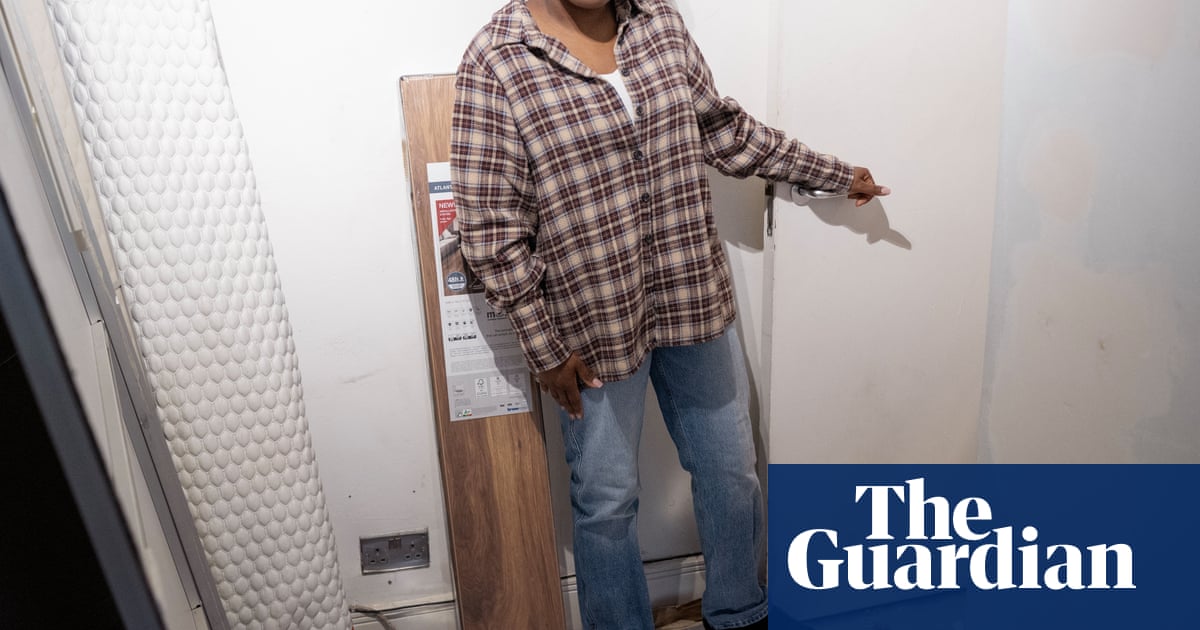Kerianne Wilson and her son have been taking it in turns to sleep on the sofa in their crammed living room since 2022, when a leak caused major damage to their two-bedroom home in westLondon.
For years, they have battled with mouldy ceilings, walls and floorboards, sodden wallpaper, collapsed ceilings and buckets on the floor. Her 20-year-old son has been unable to sleep in his damp bedroom, with all of his belongings piled up in boxes around the flat.
“I’m really tired now. This has been going on for so long,” said Wilson. “What else can I do? We’re living in this. I’m paying the rent, I work full-time and everything is paid by me, so why am I paying to live in such conditions?
“I’m worried for the safety of my son and for me with the mould – the floorboards are soaking wet, that is a hazard in itself, and they just seem to dismiss it.”
She is awaiting the results of blood tests to see if she and her son have been affected by the mould in the home, and said her son is “constantly coughing”.
Wilson is one of thousands of social housing tenants across the country who have struggled with substandard living conditions. She has filed multiple complaints, and taken her issues to theHousingOmbudsman Service, which has reported a 474% increase in complaints about poor living conditions since 2019-20.
Richard Blakeway, thehousing ombudsmanfor England, has warned the level of anger over poor-quality housing has reached such a point that it risks resulting in broader social tension.
Wilson first moved into the two-bedroom flat in Notting Hill two decades ago when her son was four months old, and they immediately encountered problems with a rodent infestation, antisocial behaviour and frequent leaks.
In her time there, the property has been managed by three different housing associations, and is now owned by Peabody, one of London’s largest housing associations, with evermore than 100,000 homes.
Peabody said it had sent contractors to carry out repairs on Wilson’s flat on Wednesday. “We’re sorry Kerianne has had problems in her home and for how long the repairs have taken,” it said. “Some of the issues were caused by a leak from a neighbouring flat, which we’ve now fixed. We’re currently finishing the repairs and we’ll be making sure she’s happy with everything.”
Wilson said she was still concerned about water residue in the bathroom and hallway, and was frustrated at how long it had taken to get repairs.
“It just feels like there’s no communication. They don’t answer the phone. So you can’t even speak to anybody. The only way you can get things done is by putting in a complaint, and then it takes weeks for them to respond – they never meet their own deadlines,” she said.
When the flat was damaged by a major leak in 2022, the pair were temporarily moved to a hotel for three weeks.
Wilson said the flat had still not been fixed when they returned, the leak was still there, and workers simply “painted over the problem”. She says the leak has been intermittent ever since, and she has had to fight to get repairs done to mouldy flooring and ceilings.
She has struggled to get the time off work to be at home to allow access for the work to be carried out, and on one occasion the contractors never turned up.
The family live in the shadow of Grenfell Tower, where there is growing anger over the hundreds of families living in poor-quality social housing so close to where people lost their lives after the voices of residents were dismissed.
Wilson’s son, who lost a number of friends in the blaze, has been particularly affected. “He’s had a lot of disruption in his schooling and in his life,” Wilson said. “It’s not easy for young people to buy somewhere or to move out, so in a sense he feels stuck in here.
“He’s rummaging through all this stuff daily, having to find his uniform, having to find this and that, not having anywhere to hang things properly. He’s living out of boxes, basically. No one wants that. It’s not a way to live.”
Joe Powell, the MP for Kensington and Bayswater, where the family live, has recentlylaunched a safe and healthy homes campaignto pressure housing associations and local councils to sign up to specific commitments, including faster repairs and better communications.
“The system has to change so it delivers better for residents,” he told a packed-out residents’ meeting next to Grenfell Tower last month.
“Residents who raised concerns about their conditions [in Grenfell] were described as a nuisance or worse. And sadly, seven and a half years later, that attitude is still too common. We know this area is one of the wealthiest parts of the country, and yet we have far too many homes which have damp and mould.”
Wilson said she hoped the campaign would create more accountability but was sceptical about whether it would lead to immediate action. “OK, they might apologise, admit in some sense that they’ve mishandled things, but then how do you get them to change their ways?” she said.
A spokesperson for Peabody said: “We’re spending around £1m a day looking after and improving residents’ homes and have introduced dedicated local repairs teams to improve the service we provide. While we’re making progress, we know there’s more to do – and we’re committed to making things better.”
